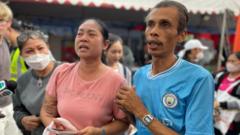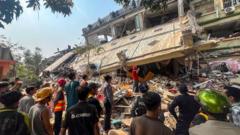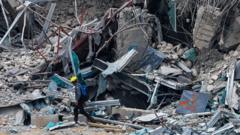As Myanmar grapples with the aftermath of a devastating earthquake, the country's ongoing isolation and political instability pose significant barriers to receiving critical humanitarian assistance. Following the military junta's unexpected appeal for international help, experts warn of potential complications in delivering aid due to the nation's fraught political landscape.
Myanmar's Earthquake Triggers Humanitarian Crisis Amidst Political Turmoil

Myanmar's Earthquake Triggers Humanitarian Crisis Amidst Political Turmoil
The earthquake in Myanmar highlights the challenges of delivering aid in a politically unstable environment.
Rescue efforts increased after the earthquake shook the region on Friday, prompting military spokesperson Gen. Zaw Min Tun to state, "We need and want the international community to provide humanitarian aid." However, this plea comes amidst ongoing sanctions imposed by the U.S. and other Western nations since the military coup in 2021, which has left Myanmar largely isolated.
Even though humanitarian aid is generally exempt from sanctions, experts highlight the significant logistical challenges that remain. Michael Martin, a nonresident fellow at the Center for Strategic and International Studies, underscored the inherent risks for aid workers attempting to deliver crucial assistance. The military's potential interference could further complicate efforts; they might restrict access to relief in areas controlled by opposition forces or alter the aid distribution to maintain the illusion of military generosity.
Furthermore, Dr. Martin noted that the military could hinder relief efforts by delaying visa approvals for international workers or slowing the processing of aid, further endangering those affected by the earthquake. As the international community mobilizes to respond to the crisis, these considerable concerns surrounding aid delivery underscore the urgent need for a thoughtful and well-coordinated global response to ensure that help reaches those who need it most.
Even though humanitarian aid is generally exempt from sanctions, experts highlight the significant logistical challenges that remain. Michael Martin, a nonresident fellow at the Center for Strategic and International Studies, underscored the inherent risks for aid workers attempting to deliver crucial assistance. The military's potential interference could further complicate efforts; they might restrict access to relief in areas controlled by opposition forces or alter the aid distribution to maintain the illusion of military generosity.
Furthermore, Dr. Martin noted that the military could hinder relief efforts by delaying visa approvals for international workers or slowing the processing of aid, further endangering those affected by the earthquake. As the international community mobilizes to respond to the crisis, these considerable concerns surrounding aid delivery underscore the urgent need for a thoughtful and well-coordinated global response to ensure that help reaches those who need it most.




